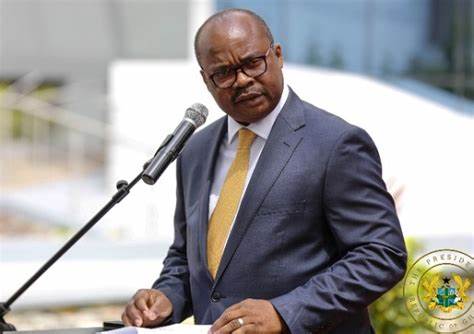In a bid to bolster economic activity and counter the headwinds faced by Ghana’s economy, the Bank of Ghana (BoG) is expected to embark on an aggressive monetary easing cycle, according to a recent report by Fitch Solutions.
The renowned financial research firm forecasts a substantial cut of 550 basis points (5.5%) in the benchmark interest rate by year-end 2024, bringing it down to 22%. This move comes amidst a backdrop of lackluster growth, fiscal consolidation efforts, and the need for stimulus measures to revive the economy.
Subdued Growth Prospects
Ghana’s real GDP growth has been persistently below trend, primarily driven by the fiscal consolidation efforts undertaken as part of the International Monetary Fund (IMF) program. Faced with the challenges of fiscal austerity, the BoG is expected to take the reins and deploy monetary policy tools to stimulate economic activity. With growth remaining lackluster, the central bank’s decision to embark on a monetary easing cycle appears to be a well-calibrated response to address the persisting growth challenges.
Falling Inflationary Pressures
Another key factor driving the BoG’s monetary easing stance is the anticipated easing of inflationary pressures. Fitch Solutions predicts that inflation will continue its downward trajectory, averaging at 17.1% throughout 2024. This decline is expected to be underpinned by several factors, including high base effects, stability in the exchange rate, and a moderation in global energy prices. By the close of 2023, the report projects that inflation will reach 20.2%, setting the stage for further reductions in the benchmark interest rate.
Risks and Uncertainties
Despite the optimistic outlook, Fitch Solutions highlights potential risks to their forecast, particularly concerning the possibility of higher interest rates. The report highlights the critical role of external debt restructuring negotiations and its impact on investor sentiment towards Ghanaian assets. A stagnation in these negotiations could potentially weaken investor confidence, leading to currency depreciation and higher inflation. In such a scenario, the BoG may find itself compelled to adopt a more hawkish stance, deviating from the baseline scenario envisioned by Fitch Solutions.
As Ghana navigates its path towards economic recovery, the BoG’s anticipated monetary easing cycle serves as a crucial component of the country’s policy response. With growth remaining subdued due to fiscal consolidation efforts, the central bank’s proactive measures aim to provide the necessary stimulus to bolster economic activity. Coupled with the expected easing of inflationary pressures, these actions could help create a conducive environment for sustainable economic growth in the medium term.
Nevertheless, it is important to bear in mind that the forecasts provided by Fitch Solutions are subject to various uncertainties and potential developments. The actual outcomes may deviate from the projected scenario, underscoring the need for continued monitoring of economic indicators and policy decisions in Ghana.





